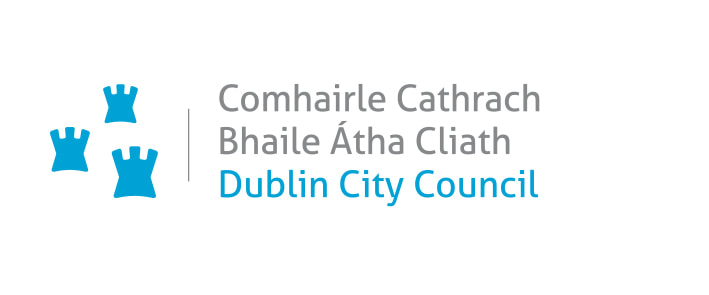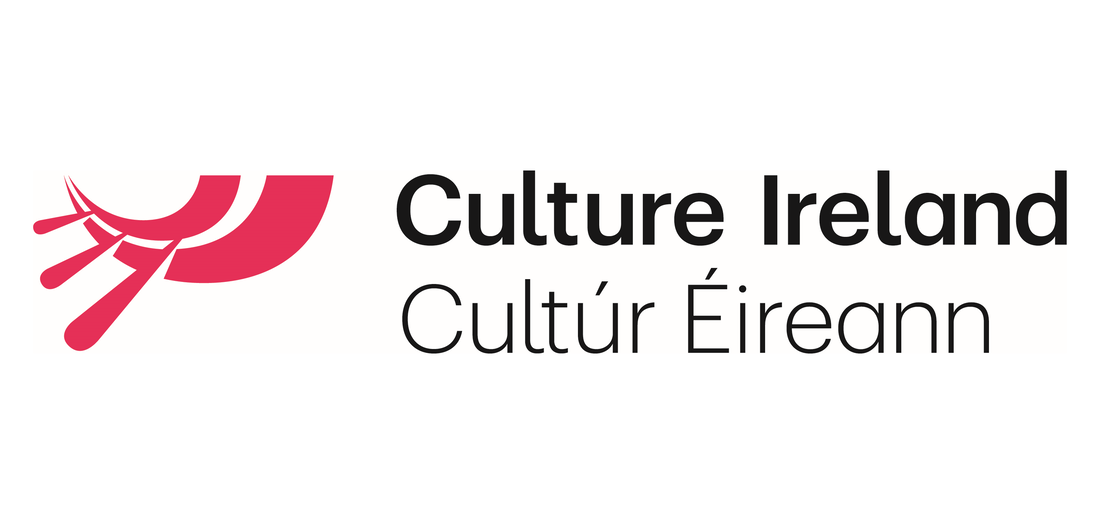|
By Ben Taylor
For my TY work experience I spent a week watching rehearsals of OUTRAGE written by Deirdre Kinahan and directed by Jim Culleton. The whole crew were so welcoming and the overall experience was fun and interesting for someone who is interested in theatre. Jim made the rehearsals such a laidback, pleasant experience whilst still working hard. He would let the actors try any suggestions and would always say ‘That’s really good guys’ or ‘That’s great guys’ after a scene. The actors would experiment and put in so much attention to detail, like what way they should pick up the typewriter and how they move across the stage. I found this really fascinating and made me appreciate everything that goes on in making a play. The rehearsals would start at 10 AM at the Lab on Foley street and I could leave when my usual school day would finish at 3.30 PM. The day would be broken up by little tea breaks and a long lunch where we would all eat baked goods while sitting in the kitchen. They would include me in all conversations, have a good laugh and ask me any thoughts or comments I had on the play. Everyone would take antigen tests at the start of everyday which made it even more relaxed to be sharing a room with no worry of Covid-19. Unfortunately, the play was a week away from showing and the actors knew all their lines so I didn’t do any line practice with them. However, I set up the stage and the observation of rehearsals was interesting enough. I talked with costume designers and met the writer, sound technician, producers and the stage manager Sophie, who was very nice to me. On the last day I went into the Fishamble office and worked with Dafni, the Marketing Officer. She taught me how they advertise the plays by using Graphic design, digital content etc. She also explained how they get organisations which appeal to the message behind the play to watch or promote it like schools, women’s rights organisations and student unions. We had interesting conversations about how the play deals with themes like the discrimination of women from that time period and how we should email these groups. This week I learned how a play can be directed in a relaxing environment and how to advertise plays to a target demographic. I would highly recommend anyone to come in for the week to see how it works and give you an idea how everyone has a role in creating a play.
0 Comments
by Síofra Corrigan
I spent my week at Fishamble watching rehearsals for their new play OUTRAGE written by Deirdre Kinahan and directed by Jim Culleton. I have a lot of interest in performance and acting and it was amazing to watch professional actors at work. I had not realised how much craft goes into each individual scene and how every single movement and motion is intentional. The play sheds light on the unspoken part of Irish History, the shame women were forced to endure and the true scale of destruction which Irish civilians were accustomed to. I loved how Jim and the actors interacted. They had conversations about scenes and the serious topics which they were portraying to ensure all their voices were heard and understood. Jim gave them the space to experiment while there was a constant offering of suggestions and ideas about how to run scenes from the actors. This made me realise that this was a space where I aspired to have a future career in. There was a lot of communication in the process and respect for every person involved. We always had the script in front of us which allowed us to see the foundations of the play while having it performed and seeing it in action. The play is about Civil War which was obviously a time of great division and the stage is separated so that you can watch either side of the performance. I think that was a very clever decision because it meant the audience was divided and one side would be watching a very different play than the other side. On Wednesday I moved from my usual spot to the other side of the room so I could see the play from both perspectives. The actors juggled playing to both sides seamlessly and they’re always enjoyable to watch. Sophie, the Stage Manager, was really brilliant and had to stay focused always so that she could read out lines to the actors if they misspoke or forgot them. I learnt how much concentration was involved for Stage Managers. On Thursday the actors had their costumes sorted which I loved to see. Costume design and historical fashion are both things I’m interested in. The costumes fit each character’s personality and really helped you to transport in the 1920s, in a war-torn Ireland. I also learnt how many decisions were made when it came to taking off coats for dramatic effect or putting on aprons to depict rural life. Props also were a big focus of this play, the main two being a bicycle and a typewriter, that were moved and used constantly. This made it feel like the characters were moving locations even though it's all set on one stage with no stopping between scenes. Chairs were used to sit and stand on, the levels of the play were always dynamic and fun to watch. The fact the play had no stopping between scenes gave it a great flow and allowed the actors to showcase their talent by switching between emotions and characters. I found Mary’s and Naoise’s ability to switch from their characters of Nell to Ms. Woods and PJ to Pat Finney and back again very impressive. I also loved Caitríona’s portrayal of Alice as it was clear she really resonated with her character. The actors were all amazing to watch and I never got tired of seeing them perform. On Friday I went to see the marketing side of Fishamble which was very cool. Art is something that focuses a lot on just creativity but It was interesting to hear all about the behind the scenes which has to happen to sell tickets and make sure the play actually gets on stage. I was surprised with how many niche audiences there are for Irish Theatre. Overall, my week at Fishamble has been really educational and fun and I would recommend the experience to anyone who wants to make a living in theatre. This week I saw all the various aspects that it takes to make a play come to life. There is something for everyone and there are no small roles! by Lilas Bailey I spent the week of the 7-11th of February at Fishamble, a theatre company located on Great Denmark Street that focuses on promoting and developing new plays. While I was there I read some previous and upcoming plays that Fishamble were putting on, sat in on table reads and performances and also learnt how the marketing and business side of Fishamble works.
On Monday and Tuesday, I sat in on a read through of a new play called “Whistling against the Wind”, written by Sarah McKenna Dunne. It follows five characters, of different ages, who live in a small village in rural Ireland. It focuses on the secrets and incidents that they cover up for fear of disrupting the social hierarchy in their village. Five actors came in to read for the roles and I had a fantastic time hearing the words on the page come to life, as well as meeting new and interesting people. On Wednesday and Thursday, I listened to a table read of another play, “untitled elegy play”, written by Andrea Stolowitz. This play was very different to “Whistling in the Wind” in the sense that instead of it being written as conversational dialogue, it was a series of interviews. These interviews were conducted by students in America who asked people in their lives how they have spent the last two years of living through a pandemic in addition to more philosophical questions about life and death. It is made so that there five actors, but 14 roles, so that each actor plays 2-3 roles. This was a very interesting concept to me because I had never seen it done before. The interviews from each character were divided up so that one character might speak for a page, then another character played by a different actor would speak. The actors were lovely and I really enjoyed talking to them about their experiences in the acting industry. It was great to be able to get advice and ask questions that will help me in the future if I pursue a career in acting and theatre. On Thursday this play was performed at Fishamble for an audience of about 8 or 9 people, including myself. I enjoyed seeing the play put together and preformed all the way through with no stops like there had been during the read through and rehearsal. On Friday, I read two upcoming plays, “Outrage” by Deirdre Kinahan and “Heaven” by Eugene O’Brien. “Outrage” was about the Irish Civil War and the affects it had on Irish Citizens. I liked the fact there were only three roles and that they told their story rather than acted it out. “Heaven” was about a middle-aged couple navigating through their marriage. This play was also written uniquely. There were only two characters and they took turns speaking in monologues, there was no dialogue. It was an unusual way to write a play and I am intrigued to see how it would be staged. I was also shown a new side of Fishamble, how marketing and business works for them. I learnt how preparations and promotion for a new production usually take place and how posters, flyers, videos, social media and their monthly newsletters are created. It was informative to see how things we have learnt about running businesses in school is put into practice in the real world. I also read two of their previous plays, “The Treaty” by Colin Murphy and “Duck Duck Goose” by Catríona Daly. “The Treaty”, as the name suggests, is about the signing of the Anglo-Irish Treaty. I enjoyed it because it gave me a different insight and perspective on the signing of the Treaty and made the characters that we read about in school come to life. I wish we read plays like this in school because I feel that the way Irish History is taught makes it seem boring when in actuality it can be fascinating. “Duck Duck Goose” is about sexual assault allegations and how this affects a friend group, who do you trust and who do you believe? This play broached the serious and important topic of consent and I think this is another play that could possibly be read in schools. Overall, this week I read plays that had been previously produced by Fishamble as well as upcoming plays. I sat in on table reads and learnt about what rehearsals are like for actors. I spoke to the actors themselves and found out how they have gotten to where they are now and where they went to college, as well as previous productions, TV series and movies they had been in. Finally, I saw how marketing and things that I have learnt in business class in school are put into practice in real life. I really enjoyed my week here. I would highly recommend this as work experience to people who are creative and interested in a future career in acting or theatre. Because I was more interested in the performance side of things, I was mainly involved in table reads and rehearsals, but if you are more interested in how the business and marketing side of things works, I'm sure here would also be an excellent place for work experience.
Our Turn by Niall Murphy
Lights up. Three people are sitting on chairs facing the audience, upstage, in a formation that appears to be a car. MAN, 60s, is holding a steering wheel. WOMAN, 40s sits next to him. GIRL, 14, sits behind. We hear the sound effects of a car motor and see the moving conveyor belt of a road projected in front of them. Girl: Was that not our turn? Man: No no. This is the way we’ve always gone. Woman: (To MAN) God forbid you’d give anything new a go. Man: Excuse me! He pauses, then nods towards an imaginary dashboard. Man: Sure I’ve a Bluetooth stereo, don’t I? MAN and GIRL laugh. The lights go down. We hear a thud. --- The lights come up. The ‘car’ has moved downstage, along the projected road. WOMAN fans herself with a folded map. Girl: Was that not our turn? MAN nods downstage. Man: Ah… this way’s better. More… reliable. WOMAN turns to GIRL. Woman: It is easier, this way. But we’ll turn off soon, don’t worry. Girl takes a phone out of her pocket, and starts tapping the screen. Girl: The maps say to turn off as soon as possible. Man: Hah! Don’t mind them maps! Woman: I am sweltering. GIRL looks out the window, head in her hands, and sighs. Girl: All the signs are saying turn off now. Woman: I know love, we just need to go a bit further, and then we’ll turn off. Lights go down. Thud. --- Lights up again. The ‘car’ has moved further downstage. Man: Going to pull in up here. MAN nods downstage. Woman: What for? Man: Petrol. Lights go down. Thud. --- Lights up. The car is closer to the edge of the stage, but MAN is gone. They’re static and the road isn’t moving. Girl: Is he coming back? WOMAN looks across the driver’s seat through the imaginary window, worried expression on her face. She pauses, then scoots across to the driver’s seat and picks up the steering wheel. We hear the engine, and the road projection begins to move. Girl: Are we going on without him? WOMAN doesn’t answer. Lights go down. Thud. --- Lights up. The car is nearing edge of the stage. WOMAN is still driving. GIRL sits in passenger seat. Girl: (In a resigned tone, barely looking up) I think that was our turn. Woman: I know. I’m sorry, okay? It’s not that easy. We don’t know where any of these turns go! Girl: (Sitting up, annoyed, pointing downstage) And do we know where this one goes? Where it ends? Woman doesn’t answer. Girl: Are you going to get out somewhere along here, like he did? WOMAN doesn’t respond immediately, sighs and answers quietly. Woman: I don’t know. Girl: Okay. So if your stop is along here, you can just… hop out. And I’ll head on and just… hope we haven’t missed the last turn. Lights go down. Thud. --- Lights up. We hear a swirling wind. The four seats that make up the car are right at the edge of the stage. WOMAN and GIRL are now standing either side of the car, at the edge of the stage. They both look out, hands over eyes, towards the audience. After a time, they look at each other for a moment. Slowly, they walk around behind the car, and stand facing each other again. WOMAN gives GIRL a set of keys. GIRL looks at them in her hand. Then, they each slowly walk back around to the opposite sides of the car, and get in. GIRL picks up the steering wheel. Niall is a writer of short stories, advertising copy, one (tiny) play, and many, many emails. When not writing or – let’s be honest – staring into space, he enjoys a dip in the sea and watching the birds in his garden. He lives in Glenageary, Co. Dublin with his wife, Ali. Twitter: @niallfromdublin Instagram: @niallskipmurphy
Big Little Changes By Sarah-Jane Scott Two people on a date. He eats chicken wings very enthusiastically. She eats her meal at normal speed. HIM What do you mean, you don’t drive? HER I just don’t. HIM How do you get around? HER We’re in Dublin. HIM Yeah but like, do you get the bus? HER Sometimes, I walk. HIM Wow. HER You said you work in town? HIM City centre. HER And you’re from Irishtown? HIM Sandymount. HER You drive in every day? HIM Yes. HER Is that not a bit… HIM What? HER Indulgent? HIM I don’t have time to be hanging around at bus stops. Busy man, you know? He licks sauce off his fingers. HER Sure. HIM I haven’t actually got the bus since fifth year. Only tools got the bus from fifth year. And girls. HER Why were they tools? HIM Don’t know. HER So how did you get to school? HIM I cycled. HER I cycle! HIM I wouldn’t now. Mad dangerous. Not enough room on the roads. HER I think adequate space needs to be made for all road users. HIM It’s not really as simple as that though, is it? He sucks a wing dry. Do you want one? HER I’m vegan. HIM I thought you ordered steak? HER Broccoli steak. HIM What? HER It’s broccoli cooked like a steak. Do you want to try? HIM You’re grand. HER Have you ever tried cauliflower wings? HIM No. HER They taste just like real wings. Sort of. HIM Is that like vegan cheese? HER What? HIM You call it cheese but it’s not. I get you have to believe that it is, because life without cheese would be grim. HER I like vegan cheese. HIM Or vegan-aise…It’s a spread, so just call it a spread. Sorry. All that clean-eating Instagram crap drives me daft. HER It’s more about climate change for me. HIM Making women feel awful. HER They are two very different things. HIM This is responsibly sourced meat. I’m doing my bit. I just don’t go on about it. HER Right. HIM A lot of your vegan stuff is imported, which isn’t doing much for your carbon footprint, is it? HER I try to eat locally and in season. HIM Is that Dublin Bay quinoa, so? HER I said I try to. HIM Right. They stop eating. HIM I might just get the bill. HER I’ll revolut you half. Beat HIM Look, I wasn’t trying to upset you there. HER It’s fine. HIM My sister was obsessed with those wellness influencers and she ended up not very well from it. HER Oh. I’m sorry. HIM I know they’re not the same thing. I’m just nervous. Talking crap. HER Sure that’s what first dates are full of. HIM All I was thinking about was, why did I order wings when I can’t wear my napkin like a bib? HER I’m not upset. He nods and goes. She watches him leave and then looks at the wings. She picks one up, eats it, then takes another loaded in blue cheese and closing her eyes, devours it. When she opens them, he is standing on front of her. HIM Forgot my card. Beat HER I’ve only been vegan for two weeks. It’s what I want, but I’m finding today really hard. HIM I know I need to stop driving everywhere, but Dublin bus is a mystery, I’m too scared to cycle and I’m mortified about it. HER Right. Do you fancy another wine? He smiles. She goes for another wing, stops, decides against it and smiles back delighted with herself. Sarah-Jane is a writer and actor. Her play Appropriate (Show In A Bag 2018) has toured extensively (Winner Lustrum Award Edinburgh Fringe 2019, Spirit of the Festival Award 1st Irish Festival NYC 2020). She is currently a Six In The Attic Artist with The Irish Theatre Institute and is under commission with An Grianan and The Town Hall Theatres. Twitter and Instagram: @sazzyjayscott
Turf Smoke by Conall Ó Beoláin The front room of a farm house in County Sligo, at night. Three siblings in their 40s/50s have gathered for the funeral of their elderly father. Sheila is looking through an old notebook. Eamonn stares into space. Pat enters with a bucket of turf and some cipíns, he sets to work at the fireplace. Sheila: Oh, come on Pat, it’s too late to put a fire down. Eamonn: That hasn’t been lit in ages, you’ll smoke the place out. Pat: You’re the one that was cold. Sheila: I don’t want to smell of smoke tomorrow, Pat. Pat: Níl aon tinteán mar do…. Eamonn: Oh don’t start that nonsense now. Pat: What? Dad always had a good fire down in here. Eamonn: (Shaking his head) Carting in and out buckets of turf. Pat: It kept you warm when you were a babby. Eamonn: An awful waste of time! Sheila: That’s not true. Eamonn: Primative. Sheila: It’s what made Dad happy. Making sure Mam had a good fire in the range for baking. Pat: And a neat stack of turf saved for the winter. Eamonn: Turf!? Don’t start. All those hours we spent on the bog, oh my God! Pat: For all the hours you spent there. Eamonn: I grew a bit of sense. Sheila: He kept the old tractor running, just for those few months in the summer. Eamonn: When he could have bought a quad. Sheila: But he loved fixing things and…..tinkering around. Dropping down to Connor’s garage for a chat. Pat: (turning to the room) I was talking to Patsy Freyne. He said they’ll use the old hearse tomorrow. Eamonn: The Mercedes? Pat: Yeah. Remember when they got it new? “2020-SO-20” - Patsy senior was so proud of that number plate! Sheila: Mam’s last journey was in that hearse. (The room falls into silence, as they reflect) Eamonn: It must be the last petrol engine on the go around here? Pat: Now, she’s away! (The fire begins to blaze). Sheila: This one might suit. (An entry in the notebook) Pat: There was always a grand draw in that chimney. Eamonn: You’ll be lucky if we don’t get reported. Pat: Reported? Eamonn: Turf smoke! Pat: What are they going to do? Send the Gardaí out? Eamonn: You better not tell your own children, they won’t be too pleased. Pat: What do you mean? Eamonn: Your Saoirse is a real eco-warrior. Pat: So? Eamonn: She can’t believe you still eat meat. Pat: I’ll eat what I bloody well like! Eamonn: If she finds out you were burning turf… Sheila: For God’s sake will ye stop! On the night that’s in it! What would Dad think? (The glow from the fire grows. Sheila leafs through the notebook.) Sheila: Listen to this one: Pat: He said no eulogy, Sheila. Eamonn: Why not? Pat: He hated all that ………..plámás! Sheila: Well, I’d like to read one of his own poems. At the end of the mass. Pat: I dunno. Eamonn: It can’t do any harm. Sheila: It’s one of the last things he wrote. Eamonn: When? Sheila: This time two years ago. I think you’ll like it, Pat. Pat: Why? Sheila: Just listen: “Kilgarvan Graveyard” “Will they walk behind me to Kilgarvan? Will the rain shower blow away, as they climb Egan’s hill? And will the sunlight catch the flowers that grow on the bend at McGowan’s? As the priest says the last few prayers, will they smell the fresh earth, and let their eyes follow the clouds racing towards Benbulben? And will a robin stand close by, perched on the handle of a spade? As they sprinkle the soil onto my coffin, Falling on me like rain” End. A native of Mayo, Conall came to drama in his 40’s, finding a home with Dalkey Players as an actor and as part of a writing group. This play reflects his love of the outdoors, Irish language and culture. Conall’s work Ar Scáth a Chéile appears in Fishamble’s Tiny Play Challenge 2020.
Come on you Boys in Green by Barry McStay Ray Robbie Both about 60. * Ray’s driveway. Robbie - Did you watch last night? Ray - God, don’t start - Robbie - We were shite. Ray - Total shite. Robbie - Absolute shite. Ray - Worst I’ve ever seen - Robbie - Worse. Ray - The pits. Robbie - Spot on - Ray - Terrible - Robbie - Weren’t we? Ray - We were. Robbie - I mean - Ray - Sure stoppit - Robbie - Slovenia. Ray - Exactly - Robbie - Slovenia. Ray - I know - Robbie - Slovenia. Ray - Don’t talk to me - Robbie - Come on - Ray - Sure look - - - - Robbie - You finally got one. Ray - Well, you have to don’t you? Robbie - Still. End of an era. Ray - End of an era. Robbie - How does she drive? Ray - Smooth enough. It’s very quiet. Robbie - That’s what they say, isn’t it? Ray - They’re right. Robbie - Almost spooky, the way they creep up on you. Ray - You’d nearly miss the rattle of the old petrol engines. Robbie - They don’t make em like that any more. Ray - They’re not allowed. Robbie - Sure this is it. - - Ray - D’you ’member - the Lada! Robbie - Larry! Ray - Larry the Lada! Ray - Italia 90! Robbie - Those were the days. Ray - Weren’t they? Robbie - Now that was a team! Ray - Big Jack! Robbie - Jackie’s Army - Ray - Olé olé olé - Robbie - “Come on you boys in green!” Ray - Driving to Italy - Robbie - You, me, Walshy and Kearney - Ray - Larry the Lada stank with us four! Robbie - He did! Ray - Some adventure. Robbie - Genoa to Rome! Ray - I didn’t get to Rome - Robbie - God, that’s right - Ray - I’ve never forgiven Paul. Robbie - I bet. Ray - Of all the days - Robbie - June 30th 1990. Ray - Exactly - Robbie - Stadio Olimpico - Ray - Exactly - Robbie - We felt bad, when you left - Ray - How d’you think I felt? Robbie - Marie would have killed you though - Ray - Oh I know - Robbie - Still - Ray - Bad enough having to come home - but having to smile after that result - Robbie - Schillachi. Ray - Schillachi. Robbie - Still. You had to. Ray - Yeah. You know yourself. Holding him. Happiest day of my life. - Bollocks was it. Robbie - He’s a good lad all the same. They’re getting married soon aren’t they? Him and - Ray - Scott, yeah - July. Robbie - That’ll be some day. Ray - Ah yeah. Robbie - Long as they’re happy. Ray - This is it. Robbie - Happiest day of his life. Ray - This is it. - - Did you watch the match with Gráinne? Robbie - Just myself. She left on Tuesday.. Ray - Back to Oz. Robbie - Exactly. Ray - Takes no time at all now, does it? Robbie - God no, blink of an eye. Ray - She’ll be back soon enough. Robbie - Not until Easter. Hopefully with the grandkids. Ray - Ah right. No time at all. Robbie - Ah yeah, it’s no distance. Ray - Not like the old days. Robbie - God no. - - Does it take long to charge? Ray - Not long at all. Robbie - That’s handy. Ray - Exactly. Robbie - Where d’you charge it? Ray - Over at Paul’s. Robbie - Would you not get one of them outlets yourself? Ray - Ah no, he and Scott already had one, you know? Robbie - Fair enough. Ray - I drop over, it’s very quick - a few minutes - I stick my head in the door. Prove I’m not dead. Robbie - God yeah. They do worry, don’t they? - - Ray - I was going to head over now. Robbie - Grand, I’ll let you get on. Ray - Are you going somewhere? Robbie - Just to the shops. Ray - Hop in there. Robbie - If you’re sure? Ray - It’s no bother. - - You’ll come round for watch the next match, won’t you? Watch it together. Robbie - If you like. Ray - They’ll be better. Robbie - They can’t get any worse. Ray - God willing. - Slovenia. Robbie - Slovenia - exactly - Slovenia! Barry is an actor & writer. His plays include Vespertilio (dir. Lucy Jane Atkinson, VAULT Festival & Kings Head Theatre) The First (dir. Emily Jenkins, VAULT Festival), The Lighthouse (Fishamble, A Play For Ireland), Bir Tawil (dir. Caitriona McLaughlin, Druid Theatre) & Our Island (dir. Maisie Lee, Dublin Fringe, Zebbie Award Nominee). His work has been longlisted for the Bruntwood, Theatre 503 & Papatango Prizes. Twitter: @bazmcstay / @VespertilioPlay
Selfish by Signe Lury CONNIE and THEO, two women in their early twenties, are onstage together, but separate. They talk as if giving independent monologues but there should be a rhythm between them. CONNIE: It was the third time we’d matched. THEO: She messaged first. CONNIE: I was drunk enough to send a message but not enough to make me creative or funny. She replied, though. THEO: It’s been about five months now. CONNIE: I wish I could just enjoy it – and I do, I think, when I’m with her I do just enjoy it – but when we’re not together and I’m alone I just start obsessing over next year, whether we’ll be together, what we’ll be doing. THEO: I can’t even picture next year. I got an offer for my dream masters – this sculpture thing – and I think I’m going to turn it down. When I saw the offer I just thought, you bitch. You selfish bitch. Sculpture? Really? Now? CONNIE: I get stuck in this mental whirlpool of trying to focus on the immediate future and not being able to think about the immediate future without thinking about the longterm future and not being able to think about the longterm future because we don’t have one. We don’t, like. THEO: Everything I do right now feels selfish. CONNIE: We only have this decade to make some kind of meaningful change and if we don’t the world as we know it is going to fall apart. I mean, it already is in some places, but people here read that in the news and think oh it must be normal, it must be normal for countries like that to have tsunamis and 30 degree heat one day followed by minus 20 the next and floods that displace your entire home, family, life. THEO: In my application I whinged on about my ‘environmentally-conscious practice’ and how it’s all about grassroots shit and if we set a new precedent everyone will follow. I only use recycled materials and I did a whole installation where I repurposed the sculptures I’d made, it’s a never-ending journey of reuse reduce recycle, I said, it’s really powerful and it’s going to make people think. CONNIE: I don’t know what I want to do next year and I know I should do something but I don’t know what. I think I’m clinging on to Theo, clinging on to her because she’s there and she’s great and I just want something I can hold onto. THEO: We’ve all entertained the thought that our art can change the world but I think part of being an artist is reaching that point where you’re like – that’s bullshit. That’s just justification for me wanting to do something that doesn’t involve numbers or spreadsheets. CONNIE: I’m worried I’m using her. Using her for certainty and some kind of stability. THEO: I know that wanting to just be with someone, away from the world and away from everything, I know that’s selfish. CONNIE: People keep telling me that I should trust my gut. That only I know how I feel. That I would know if I was using her, taking advantage of her. There’s a pause – a shift in dynamic. THEO: I think I’m gonna turn down the masters. CONNIE: Seriously? THEO: I feel like I should be doing something more meaningful. Beat THEO: No idea what that is though. Beat CONNIE: Do you wanna come over? THEO: Yeah. CONNIE: You can stay with me for a while. If you want. THEO: Yeah. I’d like that. Signe is a writer, director, and actor, graduating this year from Trinity where she studied English & Drama. She’s a co-founder of Gift Horse Theatre, an environmentally-conscious company with a focus on reimagining classic texts. Writing credits include We Are Not a Muse (Edinburgh Fringe) and Tess (Gift Horse). She veers between believing eco-theatre will change the world and believing the world is about to end. Insta: @signe.lury / @gifthorsetheatre
Cáithnín By James Ireland [One woman. Cold wind. Labhraíonn sí.] SÍ. It begins first dark earth land connected continent retreat ice and flood comes in, the climate is changing. Three thousand metre tall ice sheet wall rip through glen log, sliabh, carraig, sciúradh an tírdhreacha now gone. Across the sea we arrive. Some stay at coast. Water. Spray. Red sunset. They remember phosphorescence on seaweed and feeling you get when you’re out at sea at dawn and you’re the only person alive ever before or ever since. But what I remember is trees, scots pine, thinner on uplands so there we settle, clearing trees and smell of tree sap trunk cut firewood spit, in the morning tracks of wolves. Then one thousand years the soil is empty, we move off mountain we move inland, inland, and we clear trees too. Sphagnum moss grow over animalskin thatch huts we left behind. We repeat. We creep downwind when we hunt. We love and we cry in thunderstorms. I lay in the sun dreaming and a thin film is settling itself between me and my world. At some point I fall asleep. And when I wake up. City. Carbon-black turf-cut mountainside scar, metal glass sky-cut tarmac-sealed monstrous smoke scar ship container oil earth-blood, machine. Mountain dust water pump crust fracture net catch bottom trawl life screech, bigger, bigger, bigger, worse. Asphalt grass square manicure cut down nitrogen grow steal earth dig mineral burn, platinum war lithium conquer chlorpyrifos nitrogen soak grow and cut, grow and cut, grow and cut and shop deliver fly freight naphtha kerosene hydrocarbon burn now more ice melt so fume smoke more grow kill force feed take ask force pull tear build tear scratch scrape scour earth break still scrape force tear more. Sessile oak? Mac tíre? Neamhláithreacht. Somewhere on ocean, someone remembers a feeling. Dawn. Of no-one before and no-one since. Being only person in world. The feeling of iarmhaireacht creeping up. Somewhere someone else remembers sun on shoulderblades and dreaming, a scim descending on their eyes as they succumb to sleep. I, awake now on top of my mountain, I listen. [Cold wind.] Séideán gaoithe. When we were asleep we made planetwide world-poison. Crithir. Solid foundation whole earth shivering. Land almost gone. Planet almost gone. Our words almost. Thoughts gone. But. In gust of wind séideán gaoithe rush as something else from our-world-but-other-world passes by - there is still time to glimpse half-memory some miniscule spark last hope speck caught in corner of my eye. Cáithnín. Yes, cáithnín. A word for that now I remember it is cáithnín. My your world contains an other world and our atoms connect. Our atoms belong to each other. Today world-poison neamhláithreacht has inside beneath in the future of it another world. Cáithnín, séideán gaoithe, scim, son of the land are our word relics buried of time. Dig them out. Excavate. Find. Learn. And I can heal. Care. Share. Take sparsely. Séideán gaoithe gifts energy between world-poison now and future life. The sun gifts hydrogen helium shooting from space radiance electron heat, accept it. We do not take from sphagnum moss bratphortach, instead leave and grow, froach, bog orchid, fia, white tailed eagle, and sessile oak caorthann instead of spruce plantation dead harvest, bring corn bunting, mud pond snail, meadow saxifrage, wild boar, mac tíre. Turn grass square tarmac to birds-foot-trefoil, red clover, Devil’s-bit scabious, praiseach garbh, poipín, talamh móinéir. Turn tidal movement to electrons. To cáithnín. Catch them. Keep them. Use them. Listen to them. Work with them. Follow them. The climate is changing. Tá cneasú air. James Ireland is a gender nonconforming playwright/theatremaker. They recently graduated from the MA Writing programme at the RCA (London), where they researched actionable allyship in theatre producing. Previous work includes productions at The New Theatre and Smock Alley (Dublin), as well as The Arcola, Pleasance, and Theatre Deli (London). Instagram: @chickenfilletrollmemes www.jamesirelandplaywright.com
Salvage by Joanne Hayden Ma Feels like we’re mitching, doesn’t it? The beach in the middle of the week. You all right? Leave your crutch on the rug and I’ll take your runners off for you, let the sand between your toes. Ali I can take them off myself, Ma. Stop fussing. Ma Manage? Ali Dammit. Ma There. Better? You’re doing great, love. You’ve been taking my tonic? Ali Even more vile than usual. Yes, I’m taking it. Ma You’ll be jiving in no time. Back to taxi mum – ferrying the twins all over. Ali Teenage Terrors. Ma Girls that age have to fight their mothers. They’ll hit twenty and get sense. You’ll end up the best of friends. Just look at us. Why’re you laughing? Isn’t this lovely? Gulls in full voice. Ali Full racket. Ma See the wagtails chasing the flies? And the dunes are doing better since we cleared the buckthorn. Ali Who’s we? The knit-your-own-brown-rice brigade? Ma My fellow volunteers and I, Ali. Allotment pals. The buckthorn was taking over, pushing out the native flowers and grasses. We cleared it last spring. Ali Sorry. I know I’m grumpy. Ma Your leg set you back. Ali Stupid fall. Stupid timing. Just as I was getting used to him being gone. Ma Takes a while. Separation’s hard. Ali You bounced back. Ma I put on a good show. Ali We came here a lot the summer Dad left. Ma We did. It helped us both. The swims. The picnics. Ali Everyone else with their ham and cheese rolls. Us with our hummus and mung bean bread. No, you’re right, it did help. We’d sit here like just this. On clear days, I’d stare at the horizon, the sea a bit darker than the sky, both pure blue and nothing else there except the line between them you could barely see. I’d sit, watching, in a trance of blue and imagine sailing around the world. Can’t do it now. The view’s destroyed by those ugly yokes. Ma The turbines. Ali Blades cutting up the landscape. Why did they have to put them there? Ma I like watching them. They remind me of how we’re turning all the time, circling the sun. You, me, the twins, everyone else, nearly eight billion of us, dying, birthing, being born, falling in love, getting hurt. Ali Reminds me of how people wreck everything. Ma And build out of the wreckage. After wars and plagues and hurricanes. Break-ups. Blazing rows with your mother cause she wouldn’t buy you a pair of skyscraper shoes for your sixteenth birthday. Ali The gladiator pumps. Ma It’s your neck you would’ve broken in those. Ali I ran away. Ma You came back. We have to have hope, Ali. Ali They should’ve put them somewhere else. Ma There’s loads of wind here. It’s clean. We don’t have to dig down for it. We don’t need to destroy anything. Ali Except natural beauty. Ma Sometimes it’s about changing the way we look at things. Little things. Big things. The sun and sea and wind are abundant. All that energy. Just waiting to be harnessed. Ali Wish I could harness some of yours. Ma There’s a spare togs for you in the bag. Ali Have you lost it, Ma? I’ve a broken leg. Ma You can link me, bring your crutch. A gentle dunking is all. Be a turning point for you. Ali If I fall or drown-- Ma No one’s falling or drowning on my watch. Ali Am I actually saying yes? Ma We’ll have a picnic after. Goji berry bars. Ali Can’t wait. Joanne Hayden is a writer and arts journalist. Her fiction has been shortlisted for the Francis MacManus award, broadcast on RTÉ radio and published in literary journals including Crannóg and Banshee. She has an MA in Creative Writing from the University of East Anglia. She lives in Dublin. Twitter: @trumpetandbell |
3 Great Denmark Street
Dublin 1, Ireland
D01 NV63
[email protected]
+353 1 670 4018
@fishamble
Registered Charity
No. CHY 20103958.
Dublin 1, Ireland
D01 NV63
[email protected]
+353 1 670 4018
@fishamble
Registered Charity
No. CHY 20103958.

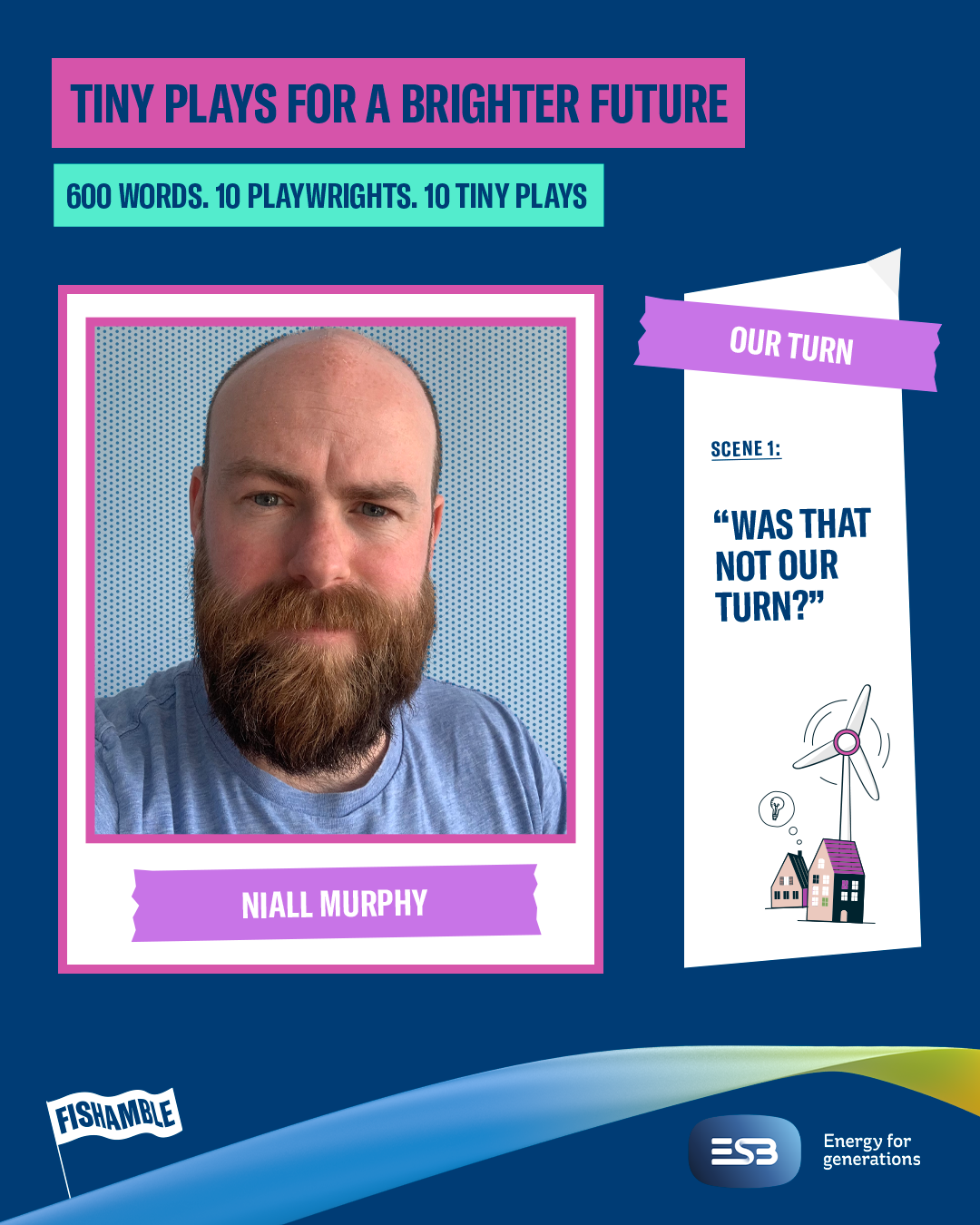
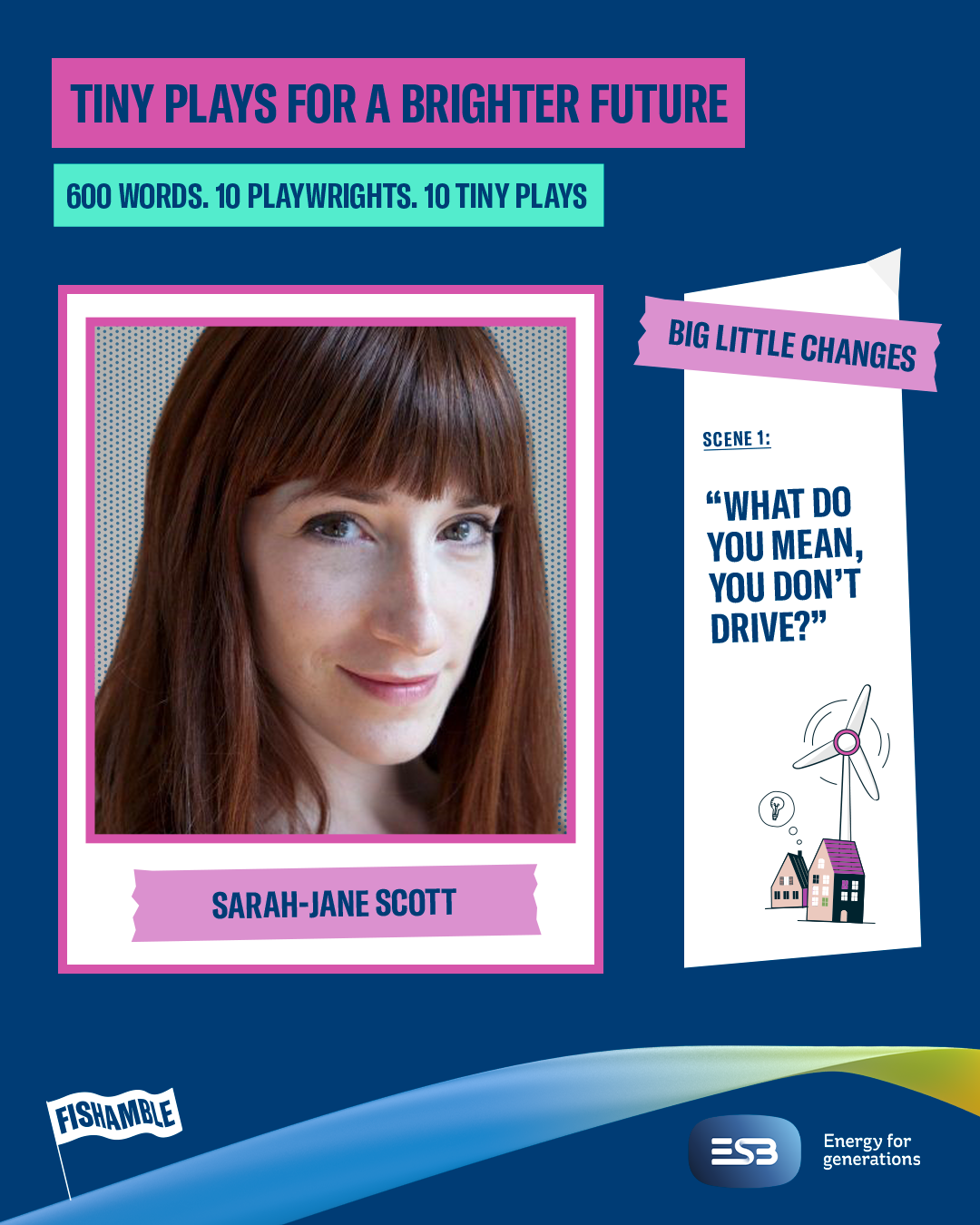
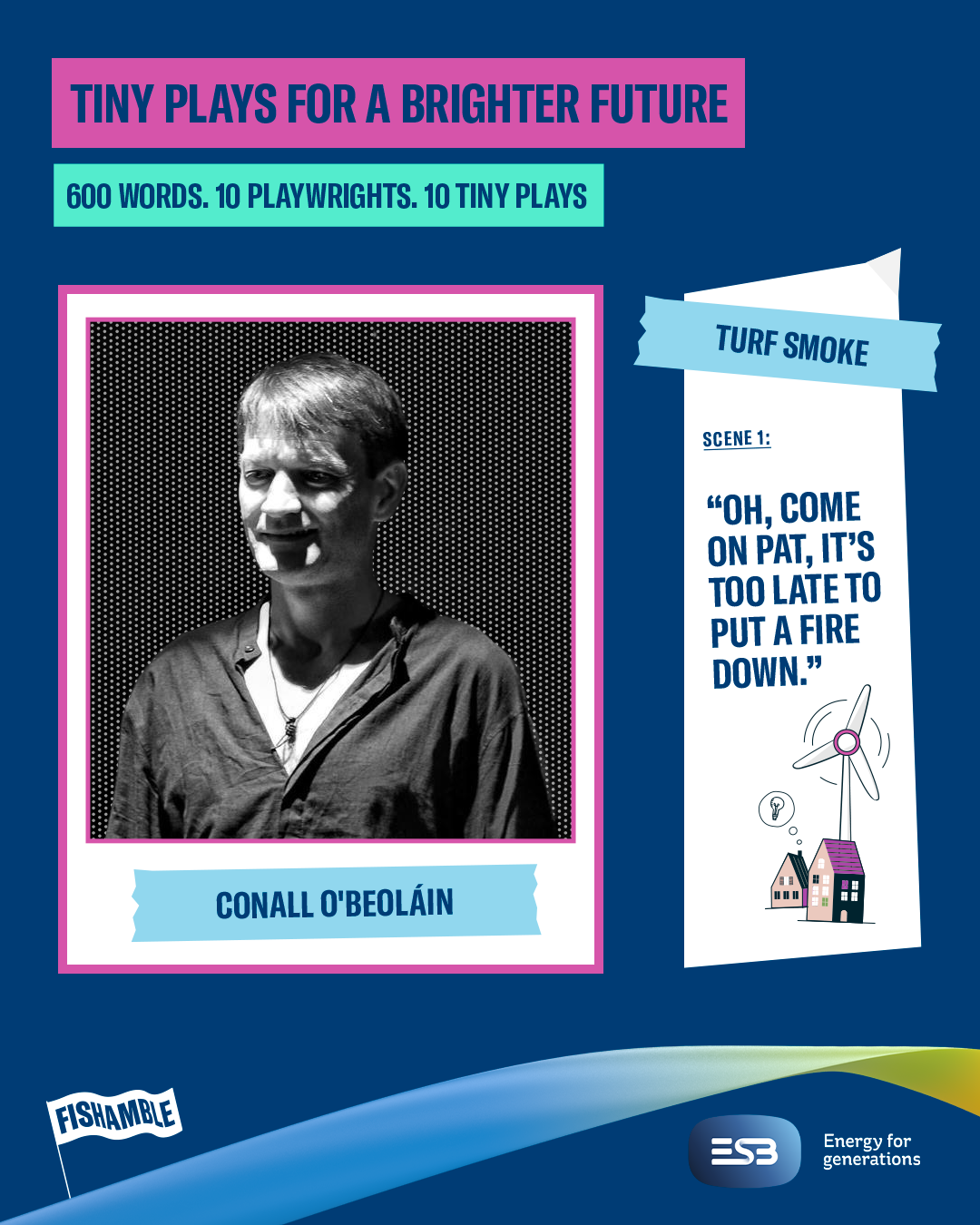
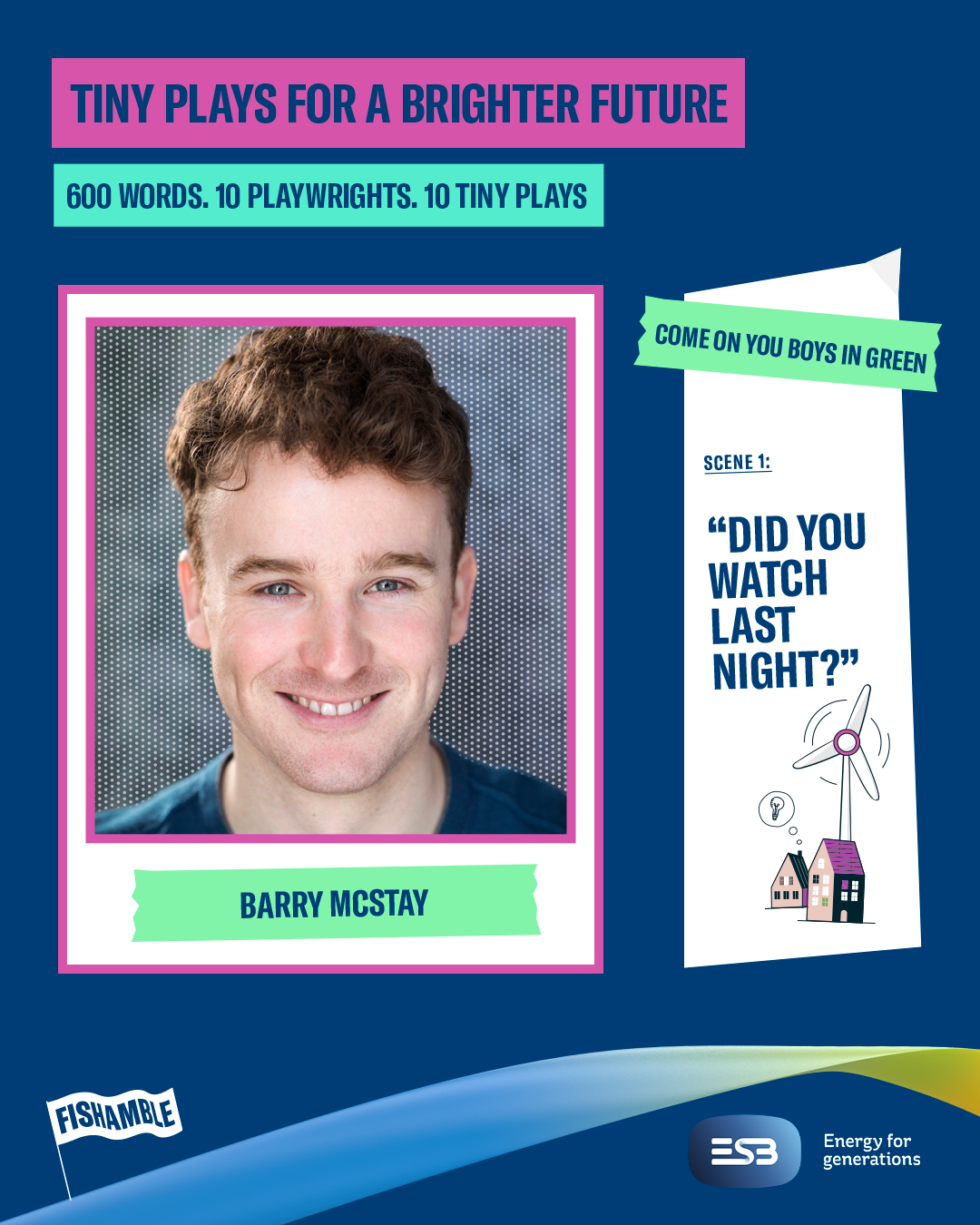
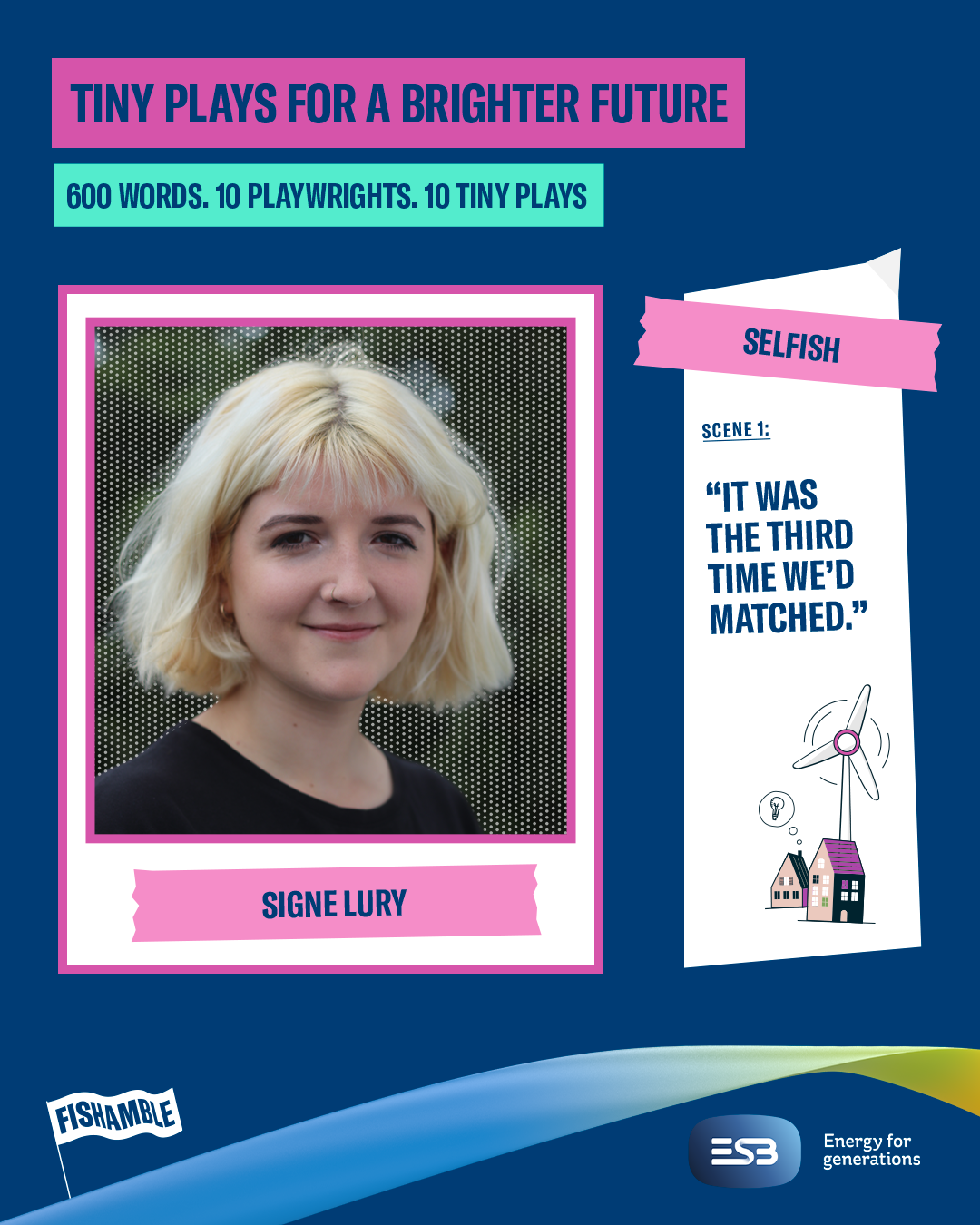
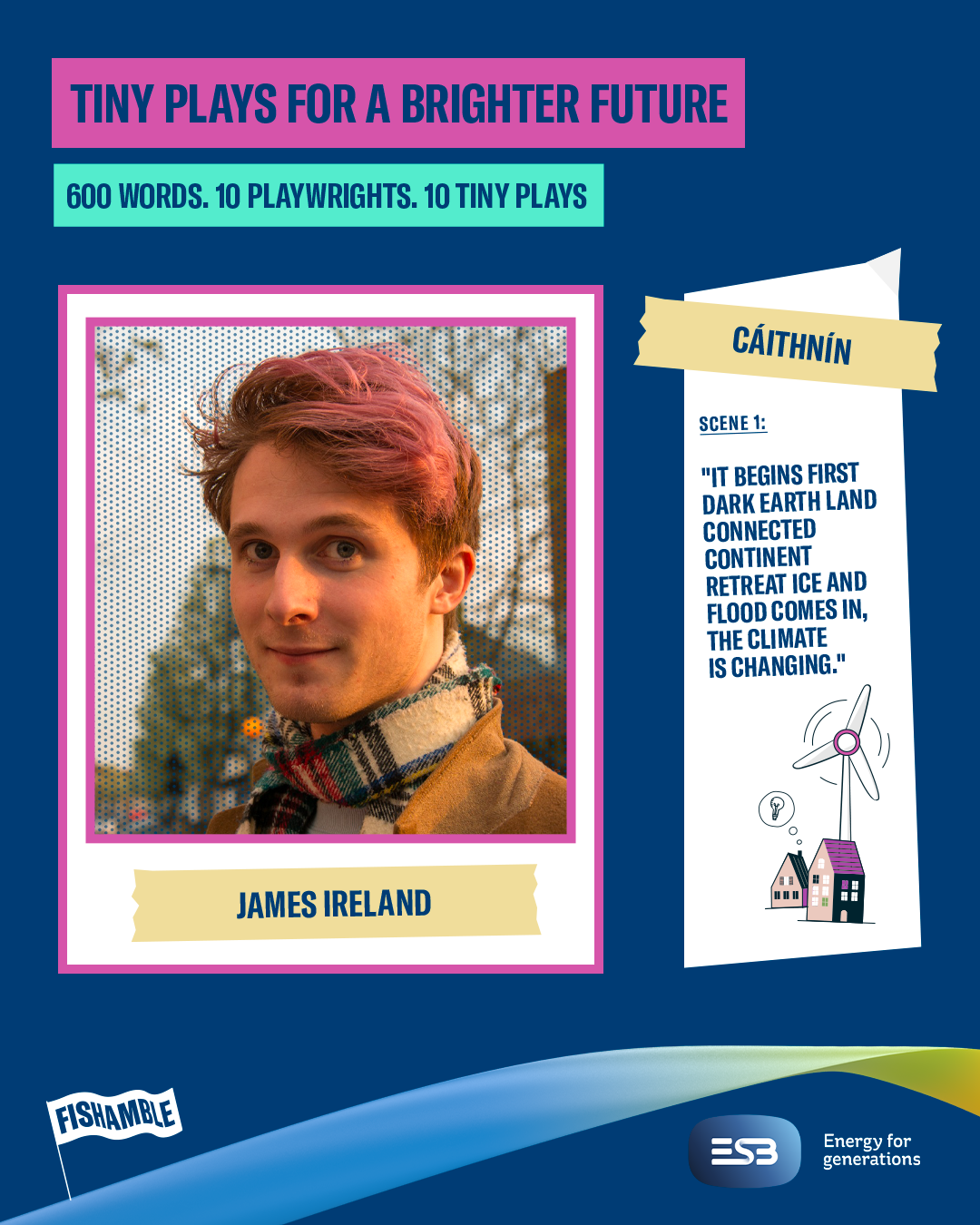
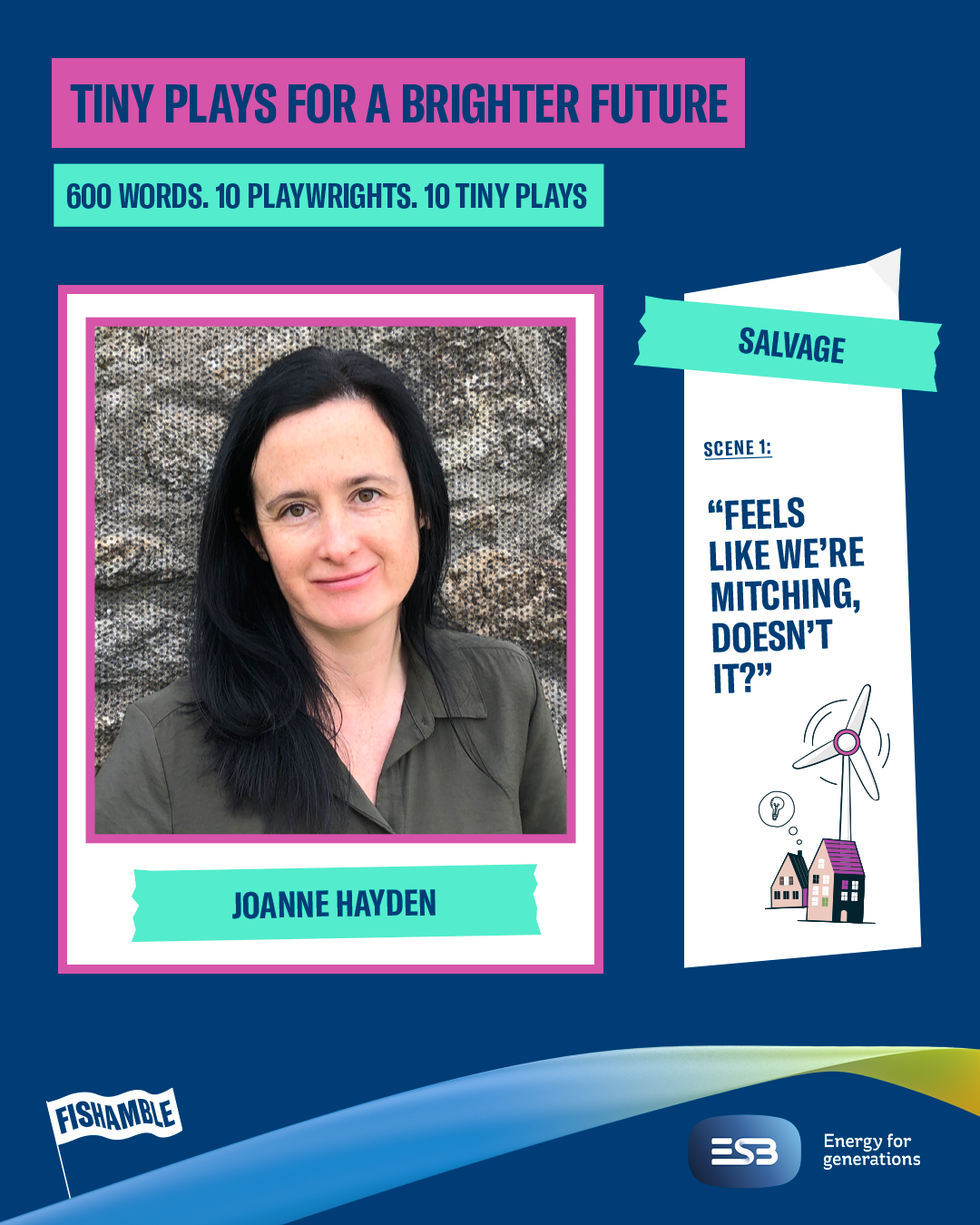
 RSS Feed
RSS Feed

